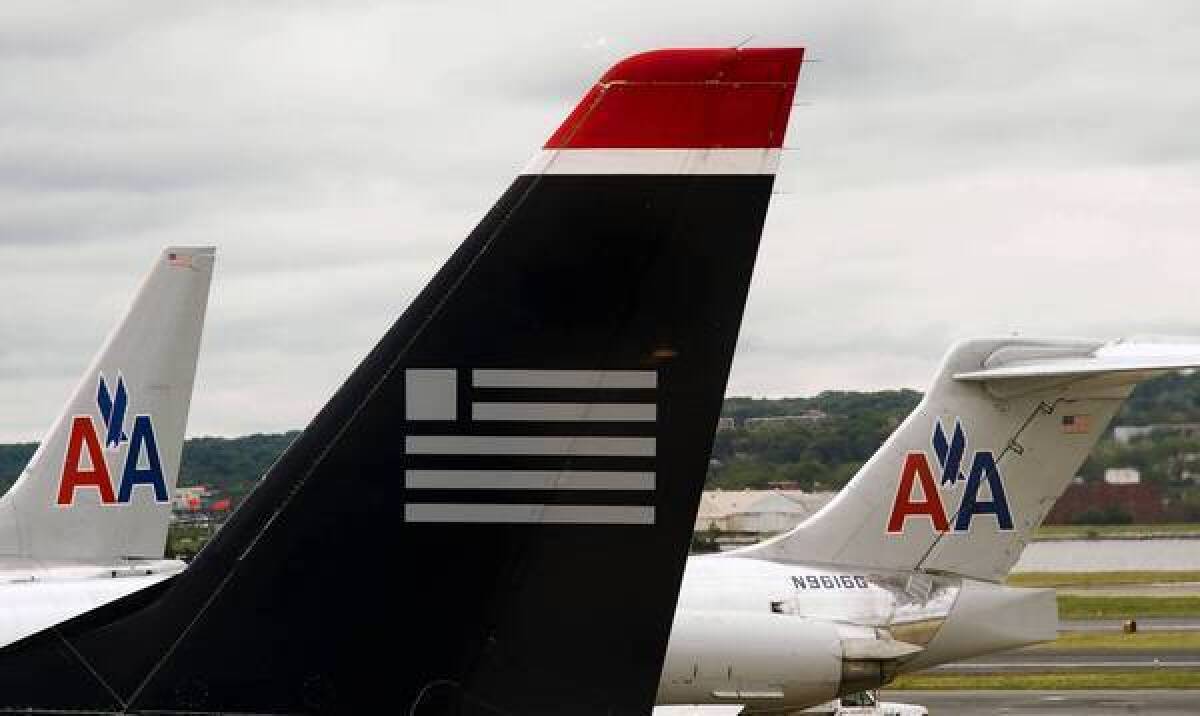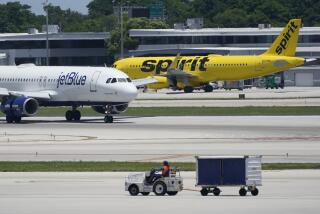U.S. sues to block American Airlines-US Airways merger

After years of airline mergers that have dramatically reduced choices for travelers, the U.S. Justice Department has sued to halt what would be the largest airline marriage in U.S. history.
The Justice Department joined six states and the District of Columbia in a lawsuit Tuesday to block the proposed merger of US Airways and American Airlines. If successful, the government could slow a consolidation craze that has dramatically cut the number of major U.S. carriers.
A US Airways-American Airlines merger would create the world’s largest airline, with more than 100,000 workers and 187 million passengers a year. The deal would put 70% of the U.S. market in the hands of just four major airlines — the others being United Airlines, Delta Air Lines and Southwest Airlines — a situation that worried authorities.
“There are many ways in which this transaction threatens competition,” Assistant Atty. Gen. Bill Baer, who heads the Justice Department’s antitrust division, said after filing the suit. “It’s pretty messed up. It’s bad for consumers.”
In reducing the number of major domestic airlines in the U.S. to four from five, the proposed merger would “make it easier for the remaining airlines to cooperate, rather than compete, on price and service,” the lawsuit said.
The lawsuit has clouded the future of American Airlines, which had planned to emerge from bankruptcy in the next few weeks to unite with US Airways and take on its larger competitors.
The legal challenge comes amid growing frustration among airline customers over rising fares, increased passenger fees and cuts in service and available seats.
“Everything is getting more expensive. We deserve better,” said Tony Tran, 39, of Los Angeles, a frequent flier who landed at Los Angeles International Airport on Tuesday. “The prices aren’t cheaper; they’re getting higher. And the consumer gets hit.”
Both airlines vowed to fight the lawsuit.
“We are mounting a vigorous and strong defense in federal court against the DOJ’s case in order to bring our airlines and talented team members together as the new American Airlines,” US Airways Chief Executive Doug Parker told employees in a letter Tuesday.
Some fliers at LAX opposed the lawsuit. “The government should get their hands out of it,” said Robert Park, 89, of Hermosa Beach. “We have a free-enterprise system.”
The government’s case included internal communications among executives at US Airways, who complained about passenger demands to improve services and suggested that a blockbuster merger would ease that pressure.
In a 2011 email exchange, one senior executive vented about the need to install in-flight wireless Internet. He wrote: “[N]ext it will be more legroom. Then industry standard labor contracts. Then better wines. Then the ability to book on Facebook.”
Parker, the CEO, wrote back: “Easy now. Consolidation will help stop much of the stupid stuff but inflight Internet is not one of them.”
A spokesman for US Airways said the government lawsuit reached a “flawed conclusion” and that “these emails are taken out of context.”
The legal roadblock comes late in the merger process. The two airlines have already received approvals from US Airways shareholders, the European Commission and the judge overseeing the bankruptcy proceedings of AMR Corp., the parent company of American Airlines.
US Airways and American compete directly on only 12 nonstop routes. But a government report said a merger would eliminate a key competitor on more than 1,600 other routes.
The bankruptcy judge was scheduled to rule Thursday on AMR’s reorganization plan.
The suit came as good news for antitrust advocates who have been voicing opposition to the merger.
“It’s about time that the Justice Department took a strong position on a highly concentrating airline merger,” said Bert Foer, president of the American Antitrust Institute in Washington.
The U.S. airline industry has experienced a wave of mergers and bankruptcies in recent years, driven by a drop in travel after the 2001 terrorist attacks, volatile fuel prices and a tough economy.
United merged with Continental in 2010, after the union of Delta and Northwest Airlines in 2008. Southwest acquired AirTran Airways in 2010.
The average domestic fare has increased nearly 17% since 2007, but when adjusted for inflation prices have risen only about 4%, according to the U.S. Department of Transportation. But on some routes where there is little competition, fares have soared.
In the last decade or so, the Justice Department has raised concerns about some proposed mergers, filed lawsuits to halt other consolidations and allowed still others to move ahead.
Speaking to reporters, Baer of the Justice Department said the agency was opposed to the US Airways-American merger because the industry landscape has changed. He also noted that recent financial reports suggest the two airlines are thriving and able to compete independently.
“If this merger were to go forward, consumers will lose the benefit of head-to-head competition between US Airways and American on thousands of airline routes across the country — in cities big and small,” he said. “They will pay more for less service.”
David Balto, an antitrust lawyer and former policy director of the Federal Trade Commission, said the Justice Department seems to be putting the brakes on more consolidations in an industry that has shrunk significantly in the last decade.
“The number of competitors matters,” he said. “I think we have reached a level of competition where the Justice Department could not stomach.”
Labor unions for American and US Airways workers, who had portrayed the merger as key to future profits and increased salaries, voiced disappointment with the lawsuit.
“A combined carrier offers our members both improvements in wages and job security,” said Garry Drummond, a spokesman for the Transport Workers Union of America. “The new American will certainly offer travelers more options and better service.”
Still, the Justice Department listed several examples to bolster the argument against a merger.
If the airlines unite, the new carrier would control 69% of the government-issued slots at Ronald Reagan Washington National Airport.
“Washington, D.C.-area passengers would likely see higher prices and fewer choices if the merger were approved,” the suit said.
The suit also argues that after the merger, US Airways would have no incentive to offer lower prices on flights that compete with Delta, United and American.
As an example, US Airways priced a one-stop, round-trip ticket in mid-August between Miami and Cincinnati at $471, but the prices were substantially higher for American ($751), United ($762) and Delta ($762), according to the suit.
Baer noted that when AMR filed for bankruptcy in 2011, it promised to emerge stronger on its own by renegotiating its labor agreements and other contracts.
“They have a viable plan to stand alone,” he said. “They were telling the world that they can make it on their own.”
Times staff writer Joe Bel Bruno contributed to this report.







